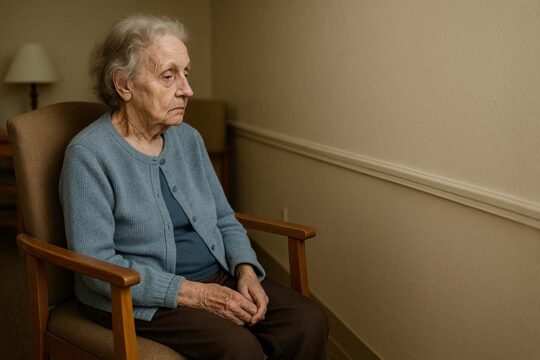
Interventions for Sexually Inappropriate Behavior in Dementia & Alzheimer’s Patients
Early Signs of Dementia Inappropriate Behavior
People with dementia are affected in different ways, and it is common for them to change how they act or feel. They are no longer in complete control, and their inhibitions will most likely change as well. This means that they might stop following societal norms in social situations. Behaviors that are not controlled can seem tactless, rude, or even offensive. Learn what to expect and how to cope to reduce stress during this transition.
Does dementia make you do inappropriate things?
Dementia arises from abnormal brain changes which cause a decline in thinking skills, also called cognitive abilities, that is severe enough to make it hard to get through the day and do things on your own. They also change how people act, feel, and relate to each other. However, every dementia patient reacts differently to the changes in their brain function.
Changes in the brain can sometimes cause a person to act in certain uncomfortable ways for their caretakers. Their mood plays a role, as does their environment but either way, you can expect a parent with dementia to act without restraint, forethought, or concern for others. Remember that these actions are caused by the person’s dementia and are not done on purpose or to hurt or offend anyone.
What is sexually inappropriate behavior in dementia?
Dementia can cause a person to act in a sexual manner that both the individual acting this way and the people around them may find difficult. A person who has dementia may have shifted in how they respond to sexual encounters, including acting in ways that are inappropriate or violent, confusing one person for another, or behaving sexually in public. Any behavior manifesting in a sexual manner constitutes sexually inappropriate behavior.
Types of inappropriate behaviors in dementia patients
Your partner or parent may sometimes treat other people in a sexual manner that makes them feel uncomfortable. They may act in a that makes care workers feel uneasy when they are helping with personal care, like helping with washing. Someone with dementia may say or do things as well. While you may think it’s time to stop getting outside help, most professionals are aware of the side effects of dementia.
The person with dementia might also act sexually around or toward children or other vulnerable people. If this happens, you will need to do something to protect them, like stop the person with dementia from spending time alone with their grandchildren. Even though this might make you feel bad or guilty, remember that it needs to be done.
Sexual acts include public masturbation, exposing genitalia, and touching breasts, buttocks, thighs, or genitalia. Implied sexual acts include asking for unnecessary genital care or openly reading pornography. Even an inappropriate joke, especially when told at the wrong time, could be an inappropriate action.
Other forms of inappropriate behavior can include unthoughtful or rude words. For example, they may put someone down in an inappropriate way. It can look like the person with dementia is trying on purpose to make the other person feel bad or bother them. Making sexual comments or flirting with someone in an inappropriate way.
You might even see them getting naked such as taking their clothes off at the wrong time or place. Finally, they may act on impulses that can seem hurtful and rude. If this was not their typical behavior before dementia, then it’s probably from dementia.
What stage of dementia is hypersexuality?
There is some evidence that hyper-sexuality and inappropriate sexual behavior (ISB) are among the earliest signs of early-onset frontotemporal dementia. However, this may not be the case for every person with dementia. Some may never display hyper-sexuality, while others may start from the beginning.
Why does dementia cause hypersexuality?
Not everything is clear about why people with dementia act so sexually. Hyper-sexual behavior may be a sign of behavioral variant frontotemporal dementia, affecting the ventromedial frontal and adjacent anterior temporal regions responsible for social behavior. But when dementia is involved, this basic desire may still be there, even as a person’s sexual and social inhibitions decrease because of worsening brain damage.
Possible causes for behavior changes in dementia and Alzheimer’s patients
Someone who used to be polite or respectful might act sexually inappropriately all of a sudden, which might seem strange. However, the behavior usually is not on purpose; it’s caused by damage to their brain. The parts of the brain that control a person’s ability to control their own actions are changed by dementia.
When people act sexually inappropriately, it could be because they want to feel close to someone again, need comfort, or are bored. People with dementia may even take off their clothes or masturbate in public from time to time. This could be because they do not know where they are and think they are in a private place. Or, they might be uncomfortable or need to go to the bathroom.
What to try and ways to react to inappropriate behavior in dementia patients
Often the best way to handle inappropriate behavior is to change the person’s attention to someone else. Remember not to scold them, as they are not in control. Here are some other methods to help:
Inappropriate behavior around care staff
Talk to their doctor, a nurse, or someone else who works in health care. They might be able to figure out why the behavior is happening and how to fix it.
Take care of sexually inappropriate behavior as it comes up and talk to professionals to let them know about the behavior ahead of time if possible.
If your loved one needs to stay in a facility, find out what the rules are about sexual relationships and sexually inappropriate behavior.
Inappropriate behavior around children and vulnerable people
Let family, friends, and visitors know ahead of time that the damage to their brain from dementia could lead to inappropriate behavior or sexual comments.
Ask other adults in a calm way to excuse their behavior or tell them to take a step back. Next, give your older adult some space from other people. Leave enough space when you walk them into a room so they cannot easily touch someone, especially if they like to grab.
Inappropriate behavior in public places
Focus on not losing your cool, as this will not help the situation. While it would not be best to handle it with humor, do try to keep a light informational tone.
Often, your calm mood can make your loved one feel the same way. Try to play down the situation when a person with dementia acts out in public. People love to look, but if you calmly tell them there is nothing to see, they are more likely to look away from the person making a scene.
If you can do it quietly, let people know your loved one has dementia, which makes it harder for them to control their moods and actions. Some experienced caregivers suggest writing or printing this explanation on small cards to give to people who meet you and your loved one on a bad day. This unspoken message is less likely to make your loved one even more upset than telling a bunch of strangers about their disability.
While you can give a small apology or explanation, remember that you are not at fault. Focus on trying to figure out what might have made your loved one act the way they did and take it out of the situation. Sometimes the reason is as simple as being hungry, thirsty, tired, in pain, having too much stimuli, or needing to go to the bathroom.
Remember that your loved one is not the cause of this trouble – it is the disease. A person with dementia has a lot of confusion and frustration that can make them act out in ways that are not appropriate. It is hard to tell the difference between a person and their condition, but keeping this in mind will help you keep your cool and deal with bad behavior no matter where you are or who is watching.
Is there support for families and caregivers to deal with a loved one’s dementia and sexually inappropriate behavior?
You should always lean on family or friends you can trust to help you with the effects of dementia, not just on them but on you, the caregiver, or your partner. Think about talking to a family member or friend you can trust. That gives you a friend in your circle who knows what is going on and can help you feel better.
If you have not found one yet, consider finding a caretaker’s support group. You are not the only one who has to deal with things like this. Support groups for caregivers are a great way to get help. If you do not feel comfortable talking about sex with other people, you might feel more at ease in an online support group.
Remember, any or all of these behaviors are a reflection of dementia and not of your parent or partner. This illness can cause problems but try not to take any act personally as they cannot control their brain or impulses. You will need support, though, as it’s easier said than done.
Related Articles
- What To Do When Elderly Parent Stops Eating
- What To Do When Elderly Parent Can’t Walk
- Trapped Caring for Elderly Parent
- Responsibility for Elderly Parent Driving
- Elderly Parent Acting Like a Child
- Elderly Parents Need 24 Hour Care
- Why Do Elderly Lose Balance?
- What Causes Hallucinations in the Elderly?
- Guardianship vs Conservatorship vs Power of Attorney
Discover the key differences between retirement homes and assisted living to help you choose the right care for your loved one’s needs.
Learn the risks of leaving a dementia patient alone, legal responsibilities, care strategies, and how to plan for their safety.
Learn why dementia patients wander at night, how to prevent it, and when memory care is the safest option for your loved one in San Diego.
Compare memory care and assisted living, from services and costs to safety and staffing, to find the right senior care in San Diego.



